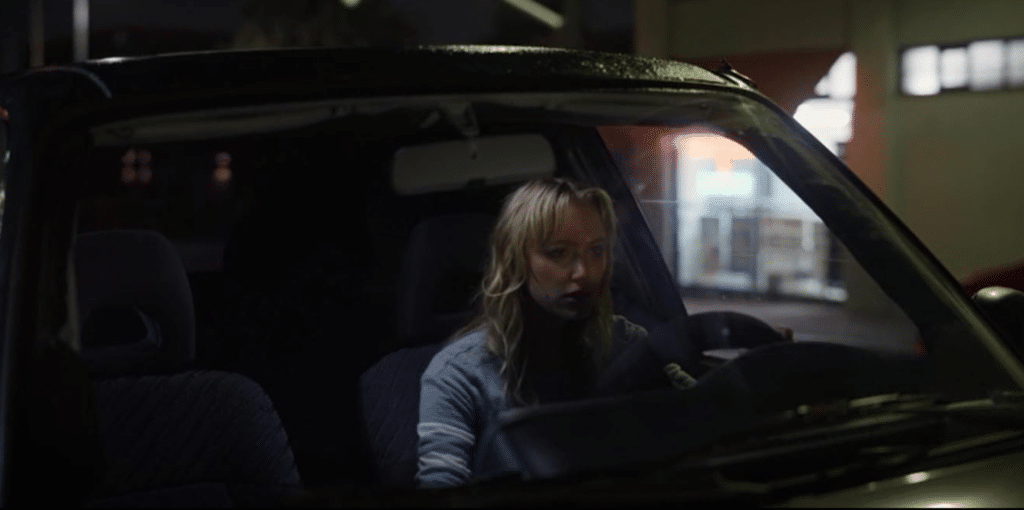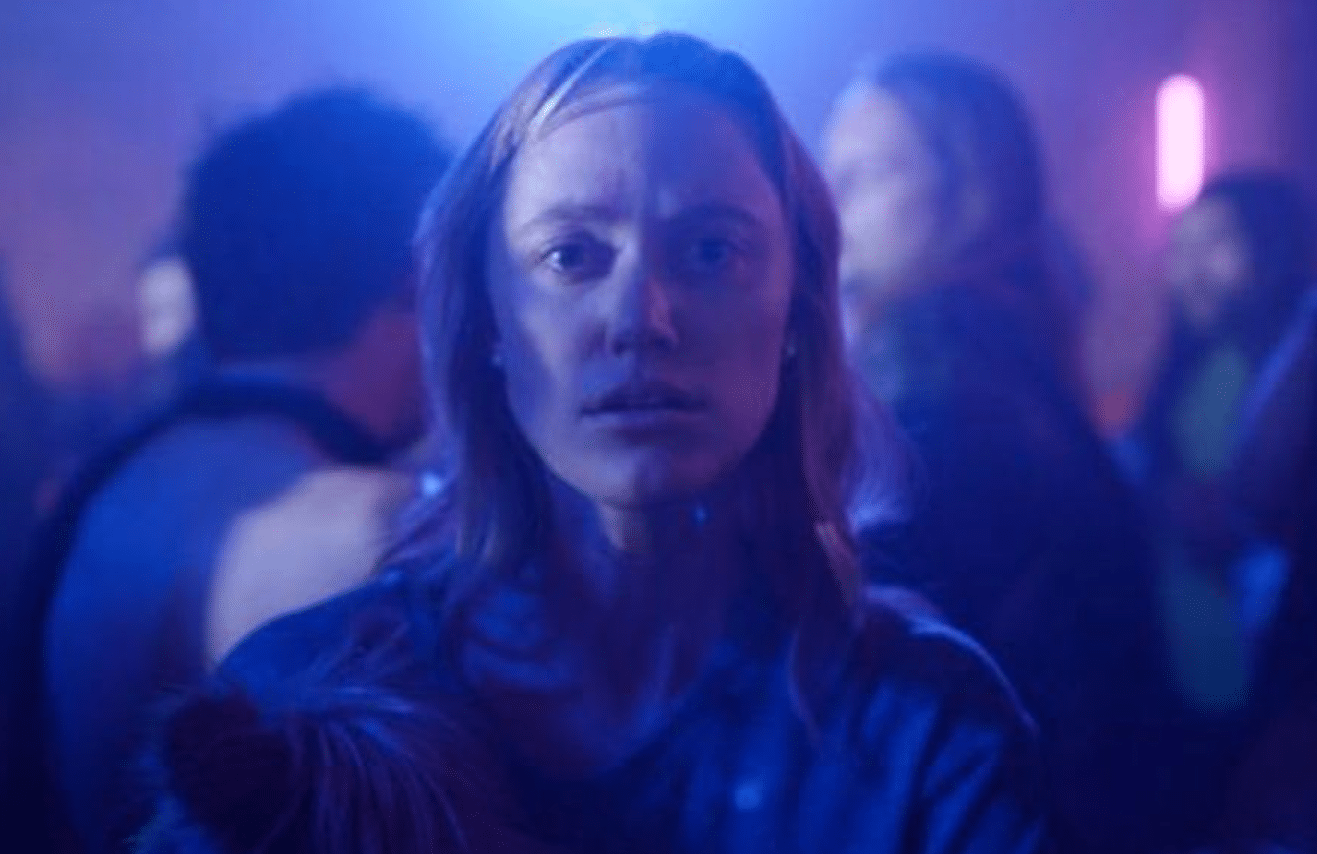
Currently climbing the rankings in the Top 15 to-stream list on Hulu is the horror/drama The Stranger. Some background: previously formatted as a 13-part episodic series for the doomed streaming service formerly known as Quibi (which has since been integrated into the Roku channel), the miniature episodes have been recut and put together into a taut 90-minute thriller with a stellar leading cast. Written and directed by Veena Sud (The Killing, Seven Seconds), the project has benefited from becoming one feature instead of several, delivering a mostly smooth ride filled with tension and even some scares.
Rideshare driver Clare (Maika Monroe, It Follows) is on a nighttime pickup for company Orbit. She’s slightly late to get a passenger, one “Carl E,” pulling up to a stunning house, letting the passenger know she’s arrived. When Carl E. (Dane DeHaan, Oppenheimer) first appears, we immediately get a sense of a powerplay as he asks to sit up front rather than in the back, saying he will store his bags there. Like most women would, Clare accommodates him, avoiding rudeness, and the two of them exchange polite banter, exposing that Clare is a recent arrival to LA as she’s not familiar with the route to LAX. A Kansas native actually, Clare has only been here six days, just her and her dog without friends or family to count on in the city, making for plenty of Wizard of Oz references about her life throughout the film.
The charming banter continues back and forth with Carl E. being maybe even a bit flirtatious. He tells her he would in fact ditch his whole flight to get dinner with her, that he knows they were meant to be tonight. And there’s the first red flag I would need to say this ride is over, but Clare doesn’t let it bother her. The talk turns to the house again and here things darken: Carl E. reveals that he has no idea who lived in the house he was picked up from; in fact, he says about 45 minutes ago he was dropped off there by another driver and he shot the woman who answered the door. He describes how he then went into the house, locating the husband, and executed him similarly. Finally, he says he went looking for the children, forcing Clare to keep her eyes on the road as he tells his despicable story, saying he used a knife for the little ones. Carl E. starts a little game with Clare saying if she wants to be a writer she should be able to tell him a good story, his tirade ripping into intense hatred of women as he insists her crying eyes are meant to evoke empathy, something for which he has no capacity.
Suddenly choosing to crash the car, Clare finds a way to end the crazed rant and tries to get away from her captor, running along the road screaming for help. Carl E. isn’t down just yet, he’s bleeding but even more enraged by her “female noise,” but he passes, out giving Clare a chance to drive away, calling 911 and arranging a location to meet officers. They question her and she tells the story Carl E. told to her: that he’s carrying a child’s body, and it’s now in the back of the car. Her story, however, is turned on its head when there’s only a blow-up doll in the backseat, making this all look like a bad joke. Unable to find his texts or profile on the app any longer, Clare is now in hot water with the police who don’t want to hear from her again. A shopkeeper at the gas station attempts to be friendly but Clare is not in the mood, disposing of the bags and dolls while the young man babbles on, and she makes it clear she’s had a long night as the man hears her story of a bad passenger and offers technical advice she doesn’t want or understand, along with another Kansas reference…
Turning off the service app, she cranks a funky version of Cindy Lauper while trying to enjoy the fresh night air driving, but an unknown number lights up her messages with a threatening warning that she should have run her fare over when she had the chance, mocking her, even referencing the song she’s listening to. Clare is frightened, erratic, trying to get home—and she makes it, coming home to her dog Pebbles in a small apartment. Making a call to Orbit’s customer service, she attempts to make a report on Carl as well as his crimes and his assault against her. But before she can get anywhere, the representative informs her they are suspending her profile pending a passenger complaint from earlier in the evening: her whole story has been mirrored by Carl E., and it seems no one is willing to believe her.
This is a chilling tale of both the worst-case scenarios of being a member of the service industry and of being a woman, wrapped in one anxious package. I used to cater highbrow events and would sometimes get groped by the clientele; of course, when I went to complain, much like for Clare, I was met with a complaint that my service was low quality rather than listening when I said I felt in danger from this person and how they interacted with me. “He said, she said,” destroys what is a clear-cut case of a man stalking a woman; Carl E. is mostly present in the virtual space, tormenting Clare via phone, video or text message, displaying a propensity to stalk his prey and enjoy their fear. He also seems to have a deeply ingrained hatred of women at the societal level, with his multiple political and cultural references that show his condemnation.
The story, where there is story, is held up quite well by its leads, especially Maika Monroe, who in her career to date often finds herself the subject of these “damsel in distress” type situations, though often flipping the matter on its head and turning fear into ferocity, like her work in Watcher or God is a Bullet (and I see some parallels in this film to her time in Watcher.) She’s the perfect selection to play the small-town girl with big fears and big problems and we will see more of her in the future as she is set to star alongside Nicolas Cage in the horror thriller piece Longlegs. Dane DeHaan does a disturbing enough job as the mysterious Carl E. and this is complemented by the innocent relationship with the gentleman at the gas station, JJ (Avan Jogia).
Dimly or harshly lit, shifting between bright, sterile fluorescence in public or the dimly lit residences of private homes, the film does its best to consider isolation in the way it’s shot (making cars, trains, or tunnels feel tight) and its soundtrack is a trip, going from tense to inspiring or even comical on a dime with excellent selections to jam to while you’re being hunted. The use of technology as a weapon makes everywhere unsafe, and when Carl E. drags another person into the game, it shows just how much reach he has (sometimes it seems like too much reach to be possible). Camerawork goes from intense long shots or explosive crashes to the eerie feeds from security or phone footage; it makes you feel continuously like you could be being watched too. Flipping the script from another popular rideshare horror film Spree, we are on the run from a killer instead of following one, and this shows there’s still horror left to harvest from this particularly risky line of work—which is especially risky for women. With the action getting started early and three intensely game leads heading the charge on this film, The Stranger luckily didn’t get left on the cutting room floor, and has its deserving 90-minute run, fully formed, and available to stream on Hulu now.
